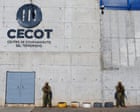
In recent developments across the globe, various issues regarding human rights abuses and international agreements have come to the forefront, drawing attention to pressing concerns and initiatives for change.
In El Salvador, concern has grown following a call for a congressional hearing on the use of federal funds to detain immigrants at a secretive prison known as Cecot. Congresswoman Delia Ramirez, representing Illinois, has urged for this investigation in light of allegations surrounding ‘human rights abuses’ within the facility. These apprehensions are timely, following nearly 300 immigrants being sent to this site after the commencement of Donald Trump’s second presidency in January. The outcome of this proposed hearing could significantly impact the broader debate over immigration policies and human rights standards in the region.
Elsewhere, New Zealand’s approach to electoral reform has sparked dialog, as attorney general Judith Collins shared concerns that recent proposals could infringe on human rights laws and particularly disenfranchise the Māori community. The reforms, which aim to modernize what the government deems as outdated electoral processes, suggest restrictions such as the closure of voter enrolment 13 days before an election, prohibiting prisoner voting, and forbidding free provisions within proximity to polling stations. Prime Minister Christopher Luxon, however, remains firm that these changes are essential for sustaining electoral integrity.
Simultaneously, the heart of Sydney is echoing with calls for symbolic justice, where the Mayor, Clover Moore, supports a proposed pro-Palestine protest march across the Harbour Bridge. This rally, rejected by some state leaders for fear of logistical chaos, is being championed as a ‘powerful symbol’ by proponents who seek to reflect community sentiment and support for Palestinian rights. The march could take place within weeks if arrangements are met, underscoring a concerted effort among organizers to engage public support and hold a peaceful demonstration.
In the Middle East, Israeli-based human rights organizations B’Tselem and Physicians for Human Rights have issued grave accusations against Israel, citing actions in Gaza that they classify as genocide. Their reports accuse Israel of systematically targeting Palestinian civilians, asserting that this reflects a broader trend of causing significant damage to Palestinian societal structures over nearly two years of conflict. Such declarations bring renewed scrutiny on international responses and the obligations of Western allies in the conflict.
Meanwhile, in the realm of international commerce, a recent agreement highlighted by the Portuguese government focuses on maintaining ‘previsibility’ and steering clear of protectionist measures. The Ministry emphasized the importance of this accord in ensuring transparency and stability for businesses engaged in international trade, noting the role of such agreements in fostering clearer trading conditions and avoiding economic disruptions.
These stories, unfolding in different corners of the world, touch upon the intricate challenges and responses surrounding human rights, governance, and international cooperation. Each scenario underscores the ongoing balance between legal frameworks, societal needs, and strategic aims within both national and global contexts.
Source: {link}
